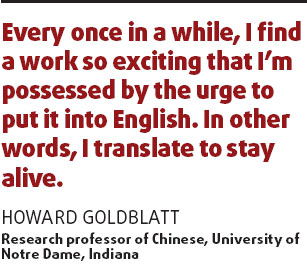
Professor Howard Goldblatt, acclaimed by some as the most important translator of modern and contemporary Chinese literature, will appear at the global launch of his English translation of Wolf Totem tomorrow in Beijing.
Published in 2004, the novel about the lives of herdsmen on the Mongolian grassland in the 1960s has created a big stir. By last December, the book's Chinese version had sold 2 million copies on the Chinese mainland, confirmed Zhao Meng of Changjiang Literature Art Press, who is in charge of the book's domestic marketing.
Last November, Jiang Rong won the first Man Asian Literary Prize with the English version of Wolf Totem at the Man Hong Kong International Literary Festival, which aims to promote Asian works of literature.
Adrienne Clarkson, a former governor general of Canada, who was chairwoman of the panel of three judges for the Man Asian Literary Prize, said: "This masterly work is also a passionate argument about the complex interrelationship between nomads and settlers, animals and human beings, nature and culture."

Penguin purchased the book's global English copyright in 2005 from Changjiang with an advance of $100,000 and 10 percent royalties. "Wolf Totem is a wonderful book - very different from many other Chinese novels. Besides the unique narrative style, it interests me because of its strong flavor of Mongolian culture. And I believe other Western readers will also find it interesting to read," the general manager of Penguin China Jo Lusby, who speaks and reads Chinese, was quoted as saying in an interview with Chinese media.
In translating Wolf Totem, Goldblatt has held to his usual high standards, including finding a student at Inner Mongolia University to check the Mongol spellings of the many transliterated Mongol words and phrases.
"The somewhat raw narration fits the austere setting and the violent circumstances of many of the situations," says Goldblatt of the book in an e-mail interview with China Daily. "The relationship between the narrator and (tribal leader) Bilgee is extremely complex and volatile, and serves to highlight the clash of cultures."
"Jiang Rong was generous with his responses to my inquiries, some textual, others contextual. (As for editorial decisions by the publisher) I cannot imagine any author who would be happy to have any of his work excised in translation."